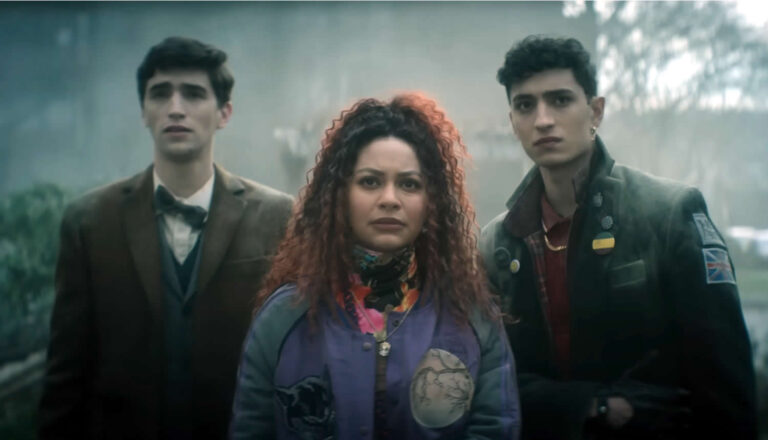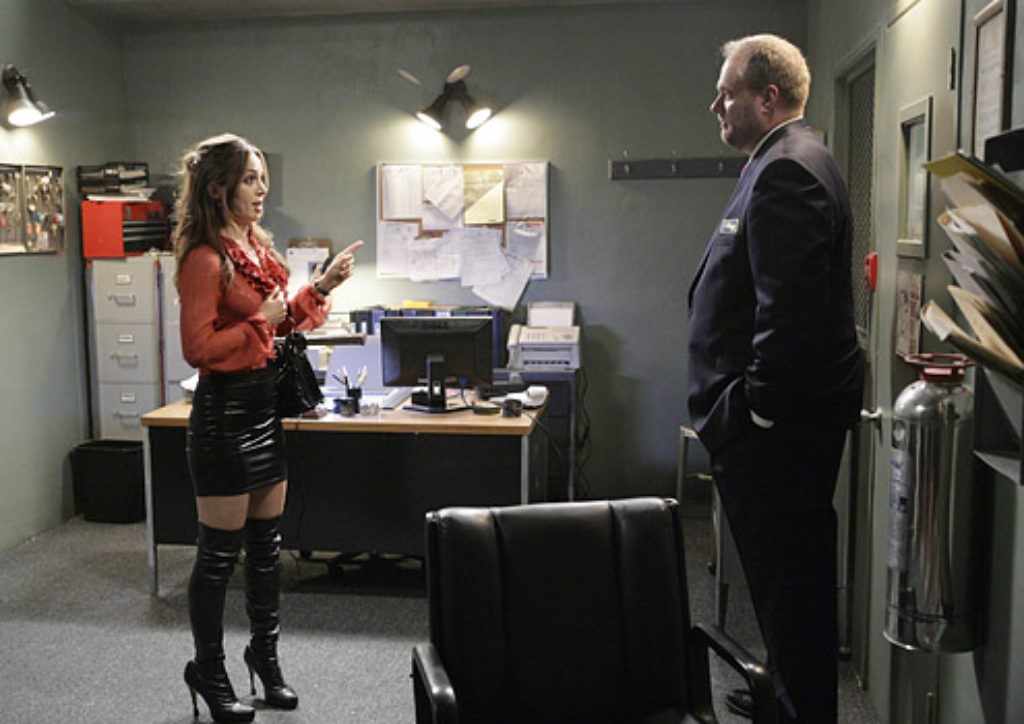
Dead Boy Detectives
Dead Boy Detectives targets teens in style and story. But it comes with very adult, problematic content.

Hey, it’s a brave new world. What once was only make-believe in sci-fi mags is now plugged into your ear or connecting you to cyberspace from the palm of your hand. It wasn’t all that long ago that Arthur C. Clarke, author of the classic book 2001: A Space Odyssey, envisioned a future where all the memories of a man could easily be removed and stored on a computer’s hard drive. And that’s not so tough to believe nowadays. In fact, researchers recently ran some tests that successfully removed memories on a molecular level from test subjects.
Stuff like that keeps you expecting just about anything to happen. Which suits TV producer Joss Whedon just fine. Best known for his work on the teen horror fantasy Buffy the Vampire Slayer and the witty, outer space cowboy saga Firefly, Whedon has given Clarke’s vision a fresh coat of paint by creating a new Fox drama called Dollhouse.
Playing Dress-Up
The twisty sci-fi thriller focuses on a secret facility that houses attractive, young volunteers—called dolls, or actives—who, in an attempt to escape their past, agree to have their memories removed and stored for later. The process reduces them to childlike blank slates until they’re imprinted with new personalities and skill sets at the behest of rich and famous dollhouse clients. These wealthy fat cats use these perfectly programmed people to carry out fantasies, crimes, adventures, or anything else that suits their high-dollar whims.
And I do mean anything. The central doll in this story is a female active, code-named Echo, who’s regularly reprogrammed with skills and memories that allow her to become everything from a white-water rafting dream date, to a hard-edged roundhouse-kicking thief, to a leather bodice-wearing and whip-snapping dominatrix. Then when she and her fellow dolls have kicked their final backside or kissed their last set of longing lips, they lay back in a fancy computerized chair and have their memories wiped clean once more.
All set for the next assignment.
This pre-programmed kicking and kissing has almost gone unnoticed by outside authorities. But not quite. An FBI agent named Ballard catches wind of the secretive goings-on and quickly becomes obsessed with finding the source of what he believes to be human trafficking. Spurring him on is his vision of Echo. If he gets to be her white knight in the process of taking down this particular set of baddies, all the better!
Even those inside the organization have a few questions about what they’re doing. Echo’s handler, Boyd—an ex-military man who monitors her engagements and stays close by in case of emergencies—isn’t exactly happy with all he sees. And, in a way, he plays the series’ deliberately diligent and all-observing conscience.
“We’re pimps and killers,” Boyd grumbles. “But in a philanthropic way.”
Brainless Beauties
Now if you’re starting to wonder if all this talk of “pimps” and dolls for hire means what you think it means … you’re on the right track—at least part of the time. The Dollhouse storyline does indeed lend itself to some risqué subject matter.
“Some people at the network were like, ‘Wait a minute, this idea that we just bought is illegal and very racy and frightens us,'” producer Whedon told the Los Angeles Times. “That for me was frustrating because what I was selling them was dangerous ground. That’s not to say that the only thing I pitched them was Echo having sex. The idea was that she was always going to be different things. Sexuality was a big part of it and certainly the most edgy and titillating part of it, but not in any way the only part of it.”
But, come on, Joss, it’s a pretty visible part, don’t you think?
Fox must have come around, though. Because Dollhouse isn’t shying away from showing things like super short skirts, lots of bare skin, sexual encounters on “dates” and even rape (we see a doll’s face as a man moves sexually on top of her). Between segments, the camera scans as much as it can of Echo’s strategically posed nude form. The dolls take coed showers. Outfits range from sexy baby doll dresses to skintight latex.
An open.salon.com blogger summed up her distaste this way: “Echo is dancing in a club in a micro mini that barely covers her hoo hoo. … Or she’s in super tight T-shirts that leave nothing to the imagination. Or she’s dressed like a sexy librarian, complete with nearsightedness given to her by the cute/nerdy scientist. And no, it doesn’t make it OK that the dollhouse is run by a woman. Objectification and misogyny are not solely male activities.”
Quite true. But many a young male viewer will be left with the overwhelming sense that women are for ogling—and fighting with. It’s a confusing mix. One week Echo is a fist-throwing, sex-kitten dynamo ready and willing to whup any man twice her size. The next she’s a helpless, whimpering victim being hunted in the woods for sport.
So what’s a, say, 14-year-old to think? Are girls to be gawked at, protected, prostituted or punched full in the face?
Setting Barbie Up for a Fall
Dollhouse, at first glance, seems to be saying, “Pick and choose your favorites.” But there’s something more here, too. Whedon is known for keeping a number of tricks hidden up his puppet master sleeve. And one has already been revealed: We aren’t being told to ogle. We’re being asked to debate.
Whedon pulls a string and wants us to wince when Echo is being hunted and manhandled. With his picture-perfect dolls he dares us to ruminate on our society’s skewed expectations of the female form. In one recent episode, he films “passersby” voicing their differing opinions (our differing opinions) on the right and wrong of what the dollhouse fantasy (or could it be the TV fantasy?) offers.
In that same episode, a multimillionaire explains to Agent Ballard that his hired doll helps him reenact an innocently tender moment he was never able to share with his beloved, deceased wife. Then, just as Whedon has worked his audience into a frenzy of mutually exclaimed understanding (or, to put it in Hallmark Channel terms, “Awww!”), he has Ballard pointing out that the man is taking the programmed girl back to the bedroom and having sex with her. He’s a John, she’s a prostitute—to put punctuation to the point. What’s the guy’s response? “Of course. What am I, an idiot?”
Even Ballard is no innocent. He’s a violent, obsessed man who’s caught up in his own twisted fantasy with Echo. In fact, the only person who doesn’t appear to want to use Echo and the other dolls for selfish reasons is Boyd. And he keeps biting his lip, growling and reminding us, “This isn’t right.”
I don’t agree with how Whedon fuels the fire of this conversation. In fact, I think his methods hurt more than they help. But I do see what he’s up to. And it’s at least a step better than just showing exploitation for exploitation’s sake.
Remembering to Forget
Whedon doesn’t stop there, I might add. Halfway through its first season, Dollhouse has started to ask questions that go beyond how we treat women. How do memories make up the people we are? Are there traumatic, life-impairing moments that we would be better off forgetting, or is the pain of life too valuable a lesson to lose? If we can’t remember our past sins … are they sins? Is there an intrinsic part of us (a soul, perhaps?) that can never be altered, no matter how slick biotechnology becomes?
So far, Dollhouse appears to be saying yes to all of the above. And that’s significant in a TV world all but subservient to utter vapidity. Here we are actually being asked to think about what we’re watching.
Still, there’s that nagging issue of Whedon’s methods. As brave a new world as we live in, we still haven’t developed our own memory-blasting chairs. And that means that after we’re done grappling with the meaning of life, the role of women and the damage done by twisting the truth, we’re not going to be able to purge Dollhouse‘s images of skin, sex and brutal uppercuts delivered to Echo’s pretty face.
Episodes Reviewed: Feb. 13, 20, 27, March, 6, 13, 20, 27, April 3, 10


After spending more than two decades touring, directing, writing and producing for Christian theater and radio (most recently for Adventures in Odyssey, which he still contributes to), Bob joined the Plugged In staff to help us focus more heavily on video games. He is also one of our primary movie reviewers.

Dead Boy Detectives targets teens in style and story. But it comes with very adult, problematic content.

An elf mage contemplates on connection and regret as she watches her human friends grow old and pass away.